If you don’t belong to China, learning how to add Chinese subtitles to videos to understand the content is crucial. While Chinese captioning might sound challenging, especially if you are not from a technical background, the process is fairly simple. However, the time to generate subtitles depends on the length of the video in question.
Well! Merely saying something won’t make much of a difference. Therefore, this guide teaches the step-by-step process of generating Chinese subtitles using the best tool available in the market. In addition, you will learn about a few alternatives that you can try, probably for comparison, before deciding upon a program that best fits your needs.
Part 1. Best Way to Add Chinese Subtitles to Videos Recommended
While several tools are available online and do the job well, only a few stand out and perform exceptionally. One such program that is versatile and pretty efficient in producing accurate outputs is BlipCut Video Translator.
BlipCut Video Translator has an integrated screen recorder and AI Clipper to help you execute your promotional and marketing strategies within a few minutes.
Some other key features that BlipCut Video Translator has include:
BlipCut Video Translator supports +125 languages for translations and transcriptions.
BlipCut Video Translator has a database of up to 70 languages for voice cloning.
BlipCut Video Translator can auto-generate subtitles.
BlipCut Video Translator produces transcriptions from audio.
BlipCut Video Translator lets you modify transcriptions and apply the changes to the translated text on the go.
BlipCut Video Translator allows you to download subtitled videos, translated videos, audio files, and subtitles as a bundle or individually according to your requirements.
BlipCut Video Translator accepts source videos from your local device, URLs, and Dropbox.
After understanding the advantages and knowing about the key features BlipCut Video Translator has, using it to auto-generate Chinese subtitles becomes as easy as child’s play. The step-by-step instructions are given below:
Step 1. Upload the Video
On the BlipCut Video Translator’s official web page, click Try Free Online.

Click Create Now inside the Video Translator tile on the next page.

Click Upload File(s) on the Video Translator page that loads on your browser next and upload the source video you want to auto-generate Chinese subtitles for.

Step 2. Set Translation Preferences
Choose the original video language in the Source language field (or leave it set to Autodetect if unsure), add output languages (one or more) from the Translate to list, and click Instant Voice Clone.
Click Translate.

Click Translate again.

Wait while BlipCut Video Translator analyzes the audio in the video, transcribes, and translates it according to your translation preferences.
Step 3. Modify Transcriptions and Translations
Make necessary modifications to the transcription from the left portion of the next page and click the Translate button at the center of the two cards to apply the changes to the translation.
Repeat this step several times to change the entire transcription if required and click Apply Changes from the bottom.

Click Export.

Step 4. Download Subtitles
On the Download File page, uncheck the Download Video box and check Download Subtitles. Choose your preferred file type from the Format drop-down list, select Chinese from Subtitle language, and click Download to download the Chinese subtitles file.

Optionally, leave the Download Video box checked and turn on the With subtitles switch before clicking the Download button to download the translated video with the hardcoded Chinese captioning.
Part 2. Other 4 Ways to Add Chinese Subtitles to Videos You Can Try
Listed below are the 4 alternatives to BlipCut Video Translator you can try to add Chinese subtitles to your videos:
1. HitPaw Online AI Video Translator
HitPaw Online AI Video Translator is an intuitive web-based tool for automatic subtitle generation and video translation. It allows users to translate videos into multiple languages, including Chinese subtitles with a few clicks. The platform provides AI-powered transcription and translation, making it easy to generate accurate Chinese captioning for social media content, educational materials, and business presentations.

Furthermore, HitPaw offers a clean interface with editing options to adjust subtitle style, position, and timing, ensuring a professional output. Users can also download Chinese subtitles in various formats for seamless sharing and distribution.
Pros
![]()
-
HitPaw Online AI Video Translator supports multiple languages, including Chinese subtitle translation.
-
HitPaw Online AI Video Translator generates AI-powered translation for fast and accurate results.
-
HitPaw Online AI Video Translator has a user-friendly interface with easy editing tools.
-
HitPaw Online AI Video Translator supports cloud-based processing with no software installation required.
-
HitPaw Online AI Video Translator offers affordable pricing plans with free trial options.
Cons
![]()
-
HitPaw Online AI Video Translator offers limited export formats in the free version.
-
HitPaw Online AI Video Translator requires an internet connection for functionality.
-
Subtitles generated with HitPaw Online AI Video Translator may need manual adjustments.
2. Veed
Veed.io Video Translator is a powerful online tool that provides automatic subtitle generation and video translation with high accuracy. It enables users to create Chinese subtitles and offers comprehensive editing options to fine-tune translations for different audiences.
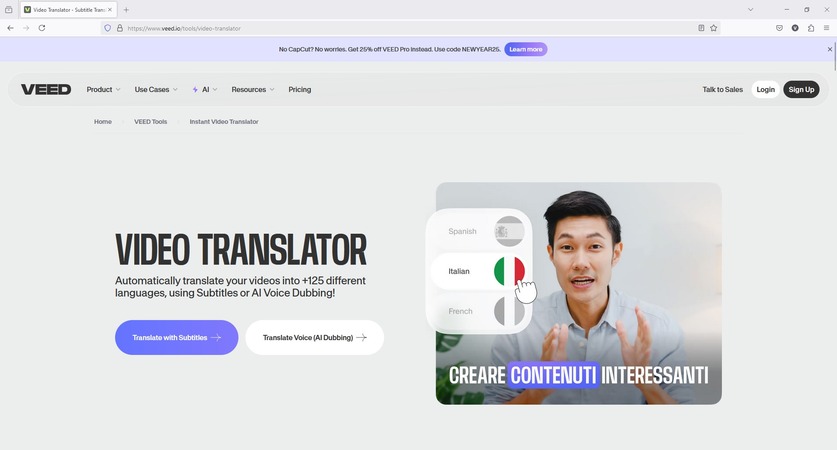
The platform is known for its intuitive drag-and-drop interface, making it easy to create and customize Chinese captioning for various types of content, including YouTube videos, presentations, and social media clips. Users can easily download Chinese subtitles in different formats, ensuring compatibility across multiple platforms.
Pros
![]()
-
Veed.io supports multiple subtitle formats, including SRT and VTT.
-
Veed.io offers AI-powered translations with manual editing options.
-
Veed.io comprises a wide range of customization features for fonts, colors, and timing.
-
Veed.io integrates with popular video platforms for seamless workflow.
-
Veed.io offers free and paid plans.
Cons
![]()
-
Veed.io’s free version includes watermarking.
-
Using Veed.io could be expensive for heavy usage.
-
Some languages in Veed.io may require manual correction.
3. Maestra
Maestra.ai offers an advanced subtitle generator that provides fast and accurate Chinese subtitles for videos. With AI-based transcription and translation, it caters to content creators, educators, and businesses looking for professional Chinese captioning solutions.
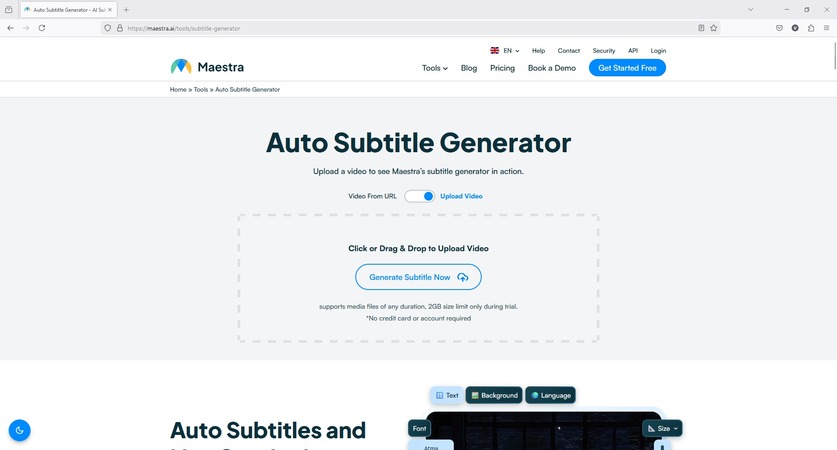
In addition, the tool provides an interactive editor that allows users to modify subtitle text, adjust timing, and customize styles to match their branding. Maestra enables users to download Chinese subtitles in multiple formats, making it ideal for distribution on platforms like YouTube, Vimeo, and social media.
Pros
![]()
-
Maestra.ai allows high-accuracy subtitle generation with AI support.
-
Maestra.ai offers multiple export options, including SRT, VTT, and TXT.
-
Maestra.ai has cloud-based storage with team collaboration features.
-
Maestra.ai supports over 80 languages, including Chinese subtitle translation.
-
Maestra.ai is a secure and GDPR-compliant platform.
Cons
![]()
-
Maestra.ai’s premium features require a subscription.
-
Subtitle synchronization on Maestra.ai may need manual fine-tuning.
-
Maestra.ai’s free trial offers limited usage.
4. Zeemo
Zeemo.ai is an AI-powered video translation tool that simplifies the process of creating accurate Chinese subtitles. It offers automatic speech recognition and translation features, making it an excellent choice for content creators who want to produce multilingual videos effortlessly.
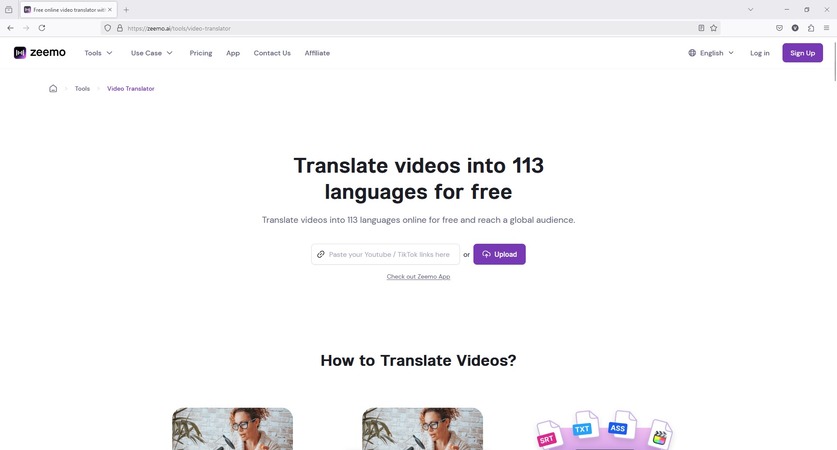
Zeemo provides professional-grade Chinese captioning with precise timestamps and style customization options. The platform's cloud-based service allows users to download and use Chinese subtitles across various video platforms.
Pros
![]()
-
Zeemo.ai offers fast and accurate AI-driven subtitle generation.
-
Zeemo.ai comprises customizable subtitle styles for a polished look.
-
Zeemo.ai supports multi-format subtitle downloads for different platforms.
-
Zeemo.ai supports batch processing for multiple videos at once.
-
Zeemo.ai has affordable pricing plans with no hidden costs.
Cons:
![]()
-
Zeemo.ai requires a stable internet connection.
-
Zeemo.ai’s free plan has limited features and export options.
-
AI-generated subtitles on Zeemo.ai may require review for accuracy.
Part 3. FAQs on Chinese Subtitles You Want to Know
Q1. How to download YouTube Chinese subtitles?
A1: With several web portals available and many don’t even require signing up, downloading Chinese subtitles from YouTube might not be the best choice. This is because most of the time YouTube automatically generates subtitles, which may not be accurate. Therefore, you should consider using BlipCut Video Translator if you are quality-conscious and look for precision.
Nevertheless, if you still want to try YouTube, click the More button from the lower-right corner under the web player, click Transcript, and copy and paste the timestamped subtitles from the right pane to your favorite text editor.
Q2. What is the best font for Chinese subtitles?
A2: To be honest, fonts don’t matter much. However, while hardcoding Chinese subtitles into your videos, ensure that you use a contrasting color background. This will make the text appear more prominently on the screen.
Q3. How to get auto-Chinese subtitles?
A3: Consider revisiting ‘Part 1’ of this guide to learn how to use BlipCut Video Translator to auto-generate Chinese subtitles for your videos.
Q4. How to convert English subtitles into Chinese?
A4: The answer is again BlipCut Video Translator. You can visit this link to convert English subtitles into Chinese using BlipCut’s web version.
Conclusion
While you can use YouTube for Chinese subtitles or visit any of the alternate solutions suggested in ‘Part 2’ of this guide to auto-generate and add them to your videos, exploiting the advanced features of BlipCut Video Translator would be your best bet. This is because the web version of the tool is sufficient enough to assess your videos accurately, transcribe them, translate them, and create Chinese subtitles for you.
Leave a Comment
Create your review for BlipCut articles




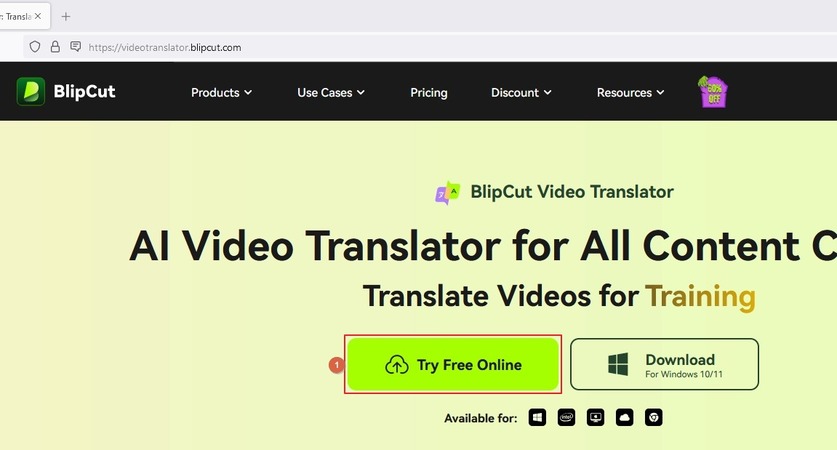
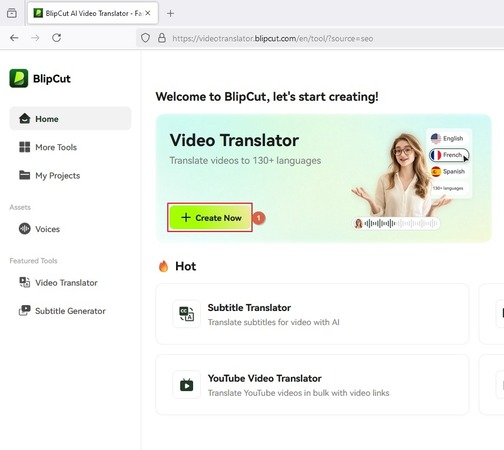
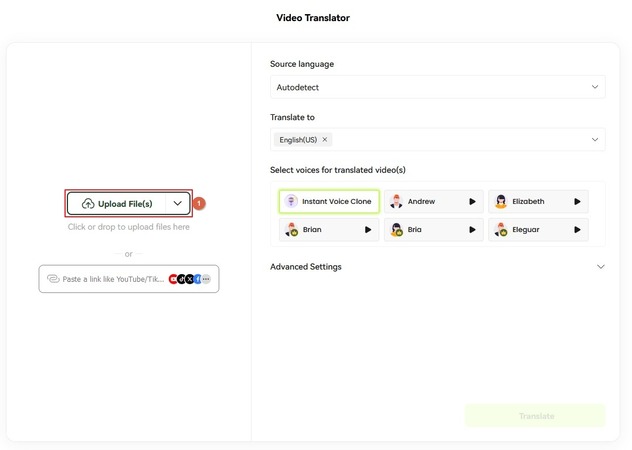
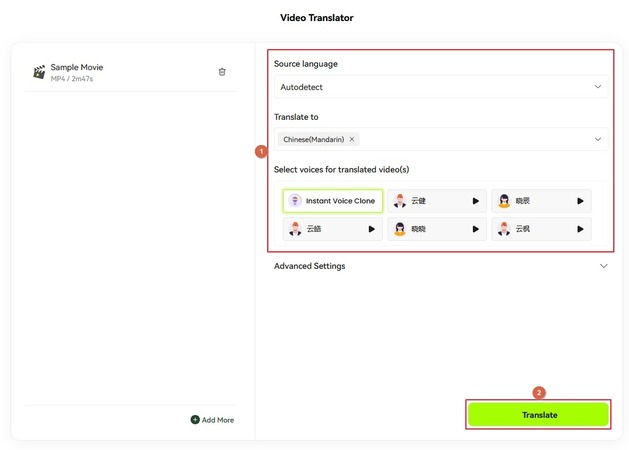
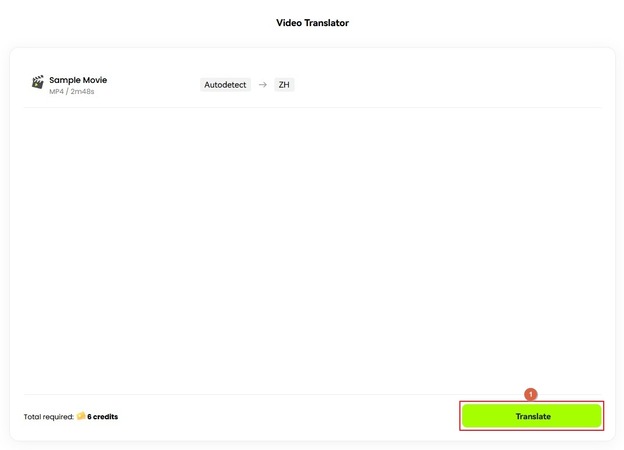
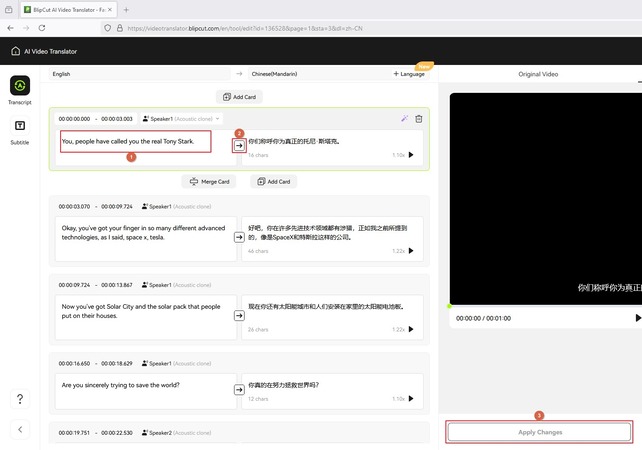
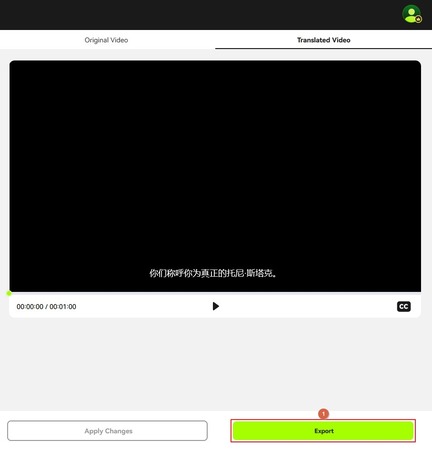
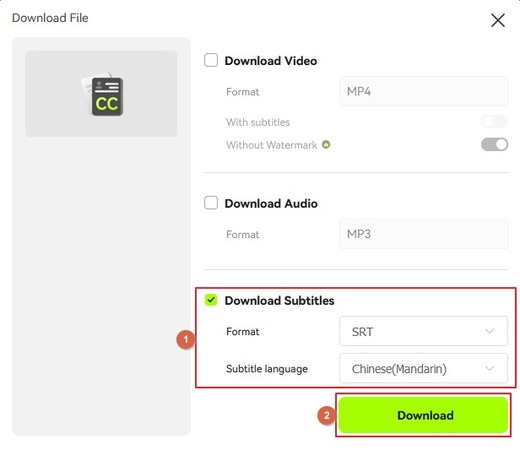



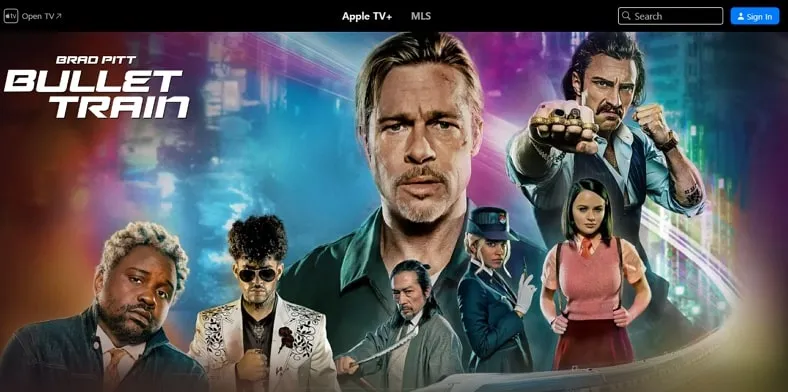

Blake Keeley
Editor-in-Chief at BlipCut with over three years of experience, focused on new trends and AI features to keep content fresh and engaging.
(Click to rate this post)